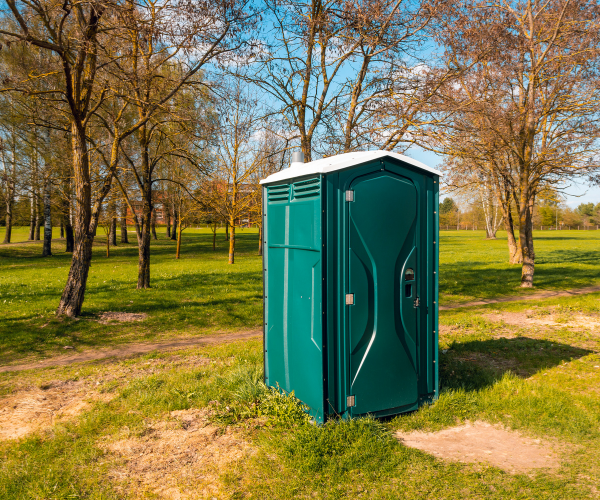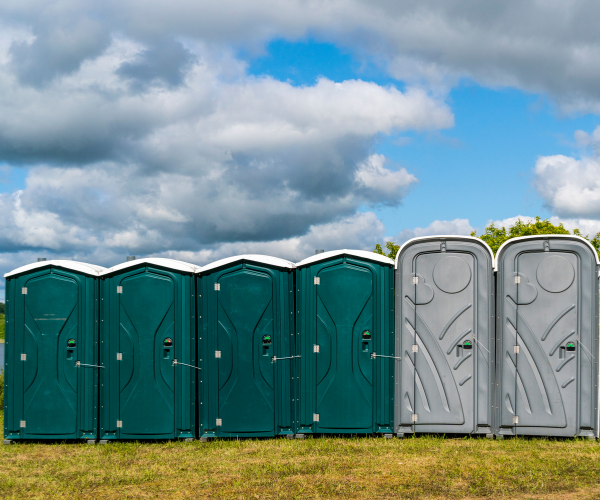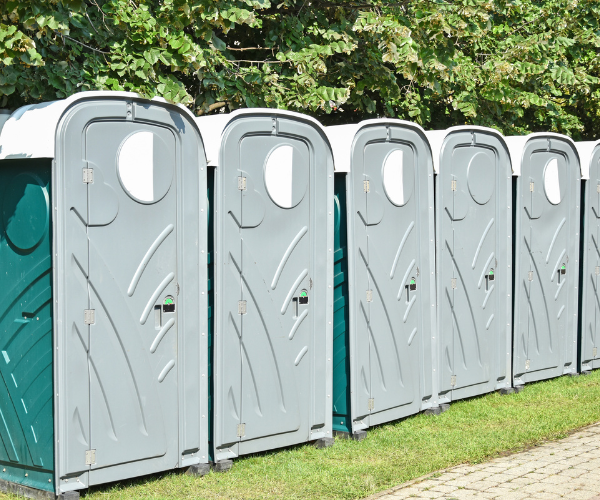Portable toilets are widely recognized for their eco-friendly advantages, offering a sustainable alternative to traditional restroom facilities. One of the most significant benefits is water conservation, as they use significantly less water than conventional toilets, amounting to a savings of thousands of gallons annually. This makes them not only environmentally friendly but also cost-effective in areas facing water scarcity. Moreover, portable toilets are designed to be highly efficient in waste management, with waste collected safely in holding tanks for treatment, minimizing the risk of environmental contamination. The cleaning processes adopt green chemicals to sanitize units without introducing harmful substances into the ecosystem, promoting a healthier environment. Additionally, by being portable, these toilets reduce the necessity for permanent construction, preserving land and reducing the carbon footprint associated with building permanent facilities. Portable toilets also contribute to healthier communities by providing access to sanitary facilities in locations where permanent installations are not feasible, supporting public hygiene, and reducing the spread of pathogens. With increasing innovation, many portable toilet models are designed to be not only ergonomic but also recyclable, further enhancing their sustainability credentials. These features combined make portable toilets an excellent choice for environmentally conscious events and constructions.

Portable Toilet Rentals in Polk County, South Carolina
Call today for a free quote (864) 477-7907
Portable Toilet
Fast, Easy, & 100% Free To Get Started
Decades of Dependable Service
With over (years of experience) years of dedicated service, our company has deep roots in Polk County, delivering exceptional quality and value. We focus on building lasting community ties and a steadfast commitment to customer satisfaction.
Unmatched Quality Service
We deliver unmatched service by ensuring each portable toilet adheres to the highest standards. Our focus on providing clean and well-maintained units highlights our dedication to excellence and customer satisfaction.
Rapid, Reliable Delivery
We take pride in providing fast and dependable delivery services to meet your timeline. Our efficient logistics ensure your portable toilets arrive on time and in excellent condition, ready for any event.
Convenient Portable Toilet Solutions in Polk County
Call for a Free Quote Today
(864) 477-7907
Based in Polk County, South Carolina, our portable toilet rental company is known for its reliability and excellent service. Locally owned and operated, we offer a wide range of services tailored for various events, including construction sites, parties, festivals, and weddings. Our commitment to dependability ensures that your events run smoothly with the utmost hygienic standards. Serving not only Polk County but also the neighboring areas, we pride ourselves on a professional and customer-focused approach. Each unit is meticulously cleaned and maintained, providing a hassle-free experience and peace of mind for our clients. Trust us for both short-term and long-term rental needs, ensuring guest satisfaction at every event.


Our standard porta john rental units are durable and reliable for any commercial build site, housing development, public works project, or remodel job.Features include dome lighting, grated floors, and an “In-Use” locking mechanism for privacy and comfort. Regularly maintained, inspected, and cleaned by FusionSite at your location.

Developed as an alternative to full ADA-compliant restrooms, the Liberty is a spacious, wheelchair-accessible unit that can also be promoted as a family-sized restroom. Includes a patented flat-floor system for easy wheelchair access and maneuverability.Handrails, paper holder, and rotary latch are designed for simple, intuitive end-user operation.

Portable hand washing stations are essential for keeping your work site sanitary and clean. Features hands-free foot pumps, liquid soap, and paper towels.Perfect for job sites without water hookups, these units can handle hundreds of washes between services.
We Proudly Serve
Standard Portable Toilets
Offering clean and dependable Standard Portable Toilets across South Carolina with LittleJohn Toilets.
High Rise Portable Toilets
Providing efficient High Rise Portable Toilets for all your construction needs in Polk County.
Restroom Trailers
Luxury Restroom Trailers available for rent in Polk County, perfect for all special occasions.
Roll off Dumpsters
Affordable Roll off Dumpsters delivered promptly by LittleJohn Toilets in Polk County.
Septic Tank Cleaning
Reliable Septic Tank Cleaning services from LittleJohn Toilets across South Carolina.
Grease Trap Cleaning
Comprehensive Grease Trap Cleaning services offered in Polk County, South Carolina.
Fencing & Barricades
Durable Fencing & Barricades installations managed by LittleJohn Toilets in South Carolina.
Residential Storage
Secure Residential Storage solutions offered conveniently in Polk County, South Carolina.
Polk County Portable Toilet and More
Renting a portable toilet has never been more straightforward or convenient. In Polk County, securing a quote or scheduling a delivery is a hassle-free process aimed at meeting your needs swiftly. With just a few clicks, you can access our online form, which only requires essential contact details like your first name, last name, phone number, and email. This efficient service ensures you receive a quick response with transparent pricing. Our robust logistics network guarantees prompt delivery, often arriving faster than expected times. Whether it's for a large-scale festival or a more intimate setting such as a wedding, our superior delivery system assures your sanitary solutions are at your preferred location when needed. Customizable rental options mean that you can select from an array of unit types to suit any occasion or requirement, enhancing the guests' comfort and event success. Key to our approach is blending local expertise with industry-leading practices, offering a service as seamless as it is reliable.

Embrace the local charm of Polk County with our exceptional portable toilet services. Nestled near the renowned Blue Ridge Mountains and amid vibrant community events like the annual Coon Dog Day festival in Saluda, we cater to all your sanitation needs. Our presence ensures that whether you're hosting a wedding pavilion amidst nature or a bustling town festival, the guest experience is enhanced by hygienic and reliable facilities. Choose our Portable Toilet services to complement Polk County's unique character. We understand the importance of seamless integration into any event setting, providing clean and convenient units that meet the expectations of our clients. The commitment to quality is reflected in every unit deployed, making us the top choice for local residents. Reliability and convenience are at the heart of our offerings in Polk County. With local expertise, we ensure easy access and quick service wherever needed. Our dedication to maintaining high service standards is why our clients consistently recommend us, ensuring events run smoothly throughout any season.
For the best portable toilet services in Polk County, our commitment is unmatched. Our longstanding reputation is built on delivering impeccable service and fostering strong ties to the community, reflecting a proud local heritage and a forward-thinking approach to customer satisfaction.Our units are top-of-the-line, providing assurance and comfort. We take pride in maintaining cleanliness and reliability, making us the preferred choice. Our experience and attention to customer needs ensure your event is a success, providing seamless service tailored to Polk County's vibrant occasions.
Our company is synonymous with swift, reliable portable toilet services in Polk County. We understand the importance of timeliness, which is why our logistics are top-notch, ensuring units are delivered on time, ready for use, and in perfect condition.Our streamlined process allows for rapid responses to any requests. Whether it's a last-minute booking or a planned schedule, our organized system ensures your event runs smoothly, providing an effortless experience backed by years of industry knowledge and local expertise.
Learn More About Our Portable Toilet in Polk County
Renting a portable toilet in Polk County is designed to be a straightforward and stress-free process. Start by filling out the form available at both the top and bottom of our website pages. This form requires basic information such as your first name, last name, phone number, and email, allowing us to contact you promptly. Throughout the website, you'll find 'Get A Quote' buttons, which provide quick access to our rental services. Upon submitting the form, our customer service team will reach out to discuss your particular needs, offer tailored recommendations, and provide a competitive quote that ensures value and quality. We prioritize your convenience through our user-friendly online booking system and our commitment to timely customer interactions. Our team is dedicated to helping you choose the best portable toilet solutions suited for your event, considering factors such as duration, location, and audience size. Whether you need a single unit for a small gathering or multiple units for a large-scale outdoor event, we are equipped to cater to your requirements efficiently and effectively.
Our company prides itself on a quick turnaround time for portable toilet delivery, understanding that our clients' needs are often immediate. The typical delivery timeframe ranges from a same-day service to within 48 hours, ensuring your event or construction site remains on schedule. Our robust logistics network enables us to cover a wide area efficiently, making sure your units arrive precisely when needed. Upon confirming your order, our team swiftly coordinates the delivery, considering the selected time and location that's most convenient for you. Status updates and tracking are integral to our service, providing peace of mind throughout the process. For special situations or urgent requests, we offer expedited options to ensure units are in place faster than standard delivery times. By consistently striving to exceed expectations with timely and reliable service, we stand out in the field, ensuring your portable toilet needs are met without delay.
Yes, we can provide portable toilet services for all types of events and construction services. Whether you're organizing a large festival, sports event, intimate wedding, corporate gatherings, or family reunions, our extensive product range is designed to meet any sanitary need. From luxury restroom trailers to standard porta potties, we also offer roll-off dumpsters, fencing, barricades, holding tanks, ADA-compliant units, portable sinks, and hand sanitizing stations. Each product is chosen to ensure convenience, comfort, and hygiene, making us the versatile solution for any requirement. Our team works closely with you to understand your specific needs, providing expert recommendations to cater for any number of attendees or personnel. We prioritize flexibility and customization, allowing for a cohesive setup that aligns with the nature and scope of your event or project. With our comprehensive service offerings, we ensure that every aspect of sanitation is covered efficiently, leaving you confident in the logistics and allowing you to focus on executing your successful event or undertaking your construction operations seamlessly.

